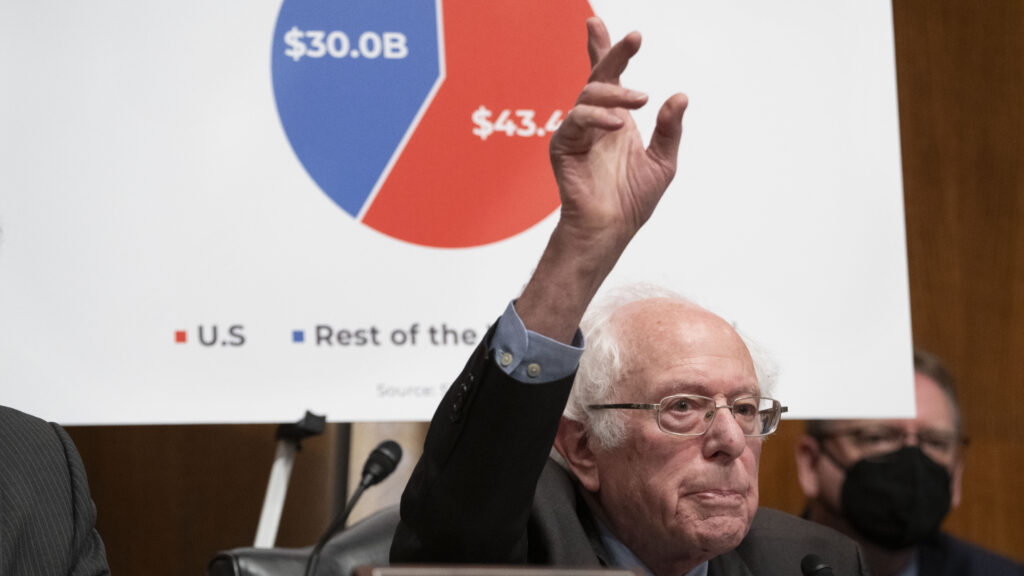WASHINGTON — Call it Sen. Bernie Sanders’ prescription drug pricing theater.
The hearing, featuring Merck CEO Robert Davis, Johnson & Johnson CEO Joaquin Duato, and Bristol Myers Squibb CEO Chris Boerner, was designed to draw public interest, and in that respect, it worked. The wood-paneled hearing room in a Senate office building was standing room only, with an overflow room prepared. Photographers flocked for photos as Sanders shook hands with each executive, standard practice before such hearings begin.
advertisement
Sanders’ staff got an arm workout switching out foam boards behind the chairman’s head, illustrating how the drug companies called to testify make more revenue from the United States on certain medications than the rest of the world combined.
But the production was thin on new ideas about how to help patients pay less for prescription drugs, and Sanders’ efforts to goad the CEOs into lowering their drug prices or freezing their salaries didn’t work.
“Will you commit today at Bristol Myers Squibb to reduce the list price of Eliquis in the United States to the price that you charge in Canada, where you make a profit?” Sanders asked Boerner.
advertisement
“Senator, we can’t make that commitment primarily because the prices in these two countries have very different systems,” Boerner replied.
The gambit didn’t amuse the panel’s top Republican, Sen. Bill Cassidy (La.), who said, “I don’t want this committee to turn into a CEO whack-a-mole.”
The executives turned to familiar talking points, like blaming pharmacy middlemen for high drug prices. They said that their revenue from drugs has not increased, even as list prices have. They did provide some solid numbers on average discounts they provide for their pricey medications — Duato estimated that the company offered an average discount of 70% for Johnson & Johnson’s anti-inflammatory medicine treatment Stelara, for example, and Davis said Merck said it only retains 10% of diabetes drug Januvia’s list price.
The CEOs agreed that their dramatically lower prices in other countries are still profitable, but contended that there is less patient access for medications in health care systems in other countries.
In the run up to Thursday’s showdown, Duato and Davis had tried to avoid testifying, arguing that the hearing was retribution for their companies’ decisions to sue the federal government over Medicare’s new prescription drug price negotiation program. Each of the three companies has at least one medication currently involved in Medicare’s ongoing first round of negotiations.
However, under threat of subpoenas, Duato and Davis agreed to voluntarily testify.
The subject of the hearing was why the United States pays more than foreign countries for prescription drugs. Sanders trotted out data about prices in the United States compared with other high-income countries like Japan and France. Sen. Chris Murphy (D-Conn.) pressed the CEOs as to whether they see the United States as shouldering the cost burden for drug innovation in the rest of the world.
The CEOs, and some Republican senators, hammered on differential levels of access to medications in foreign countries. Cassidy told the story of a woman who traveled to the United States to pay out of pocket for a cancer treatment after coverage for the treatment was rejected in Canada.
The hearing is the latest in a series of CEO showdowns from Sanders, who previously called the head of Moderna to testify about vaccine prices, and the CEOs of insulin manufacturers to speak about their pricing practices.
Sen. Mitt Romney (R-Utah) crystallized the mood of the day in his introduction: “Appreciate these executives taking time away from your responsibilities at your respective companies to be here to inform us, and in some cases to be berated by us, and give us an opportunity to pontificate on our various topics.”

